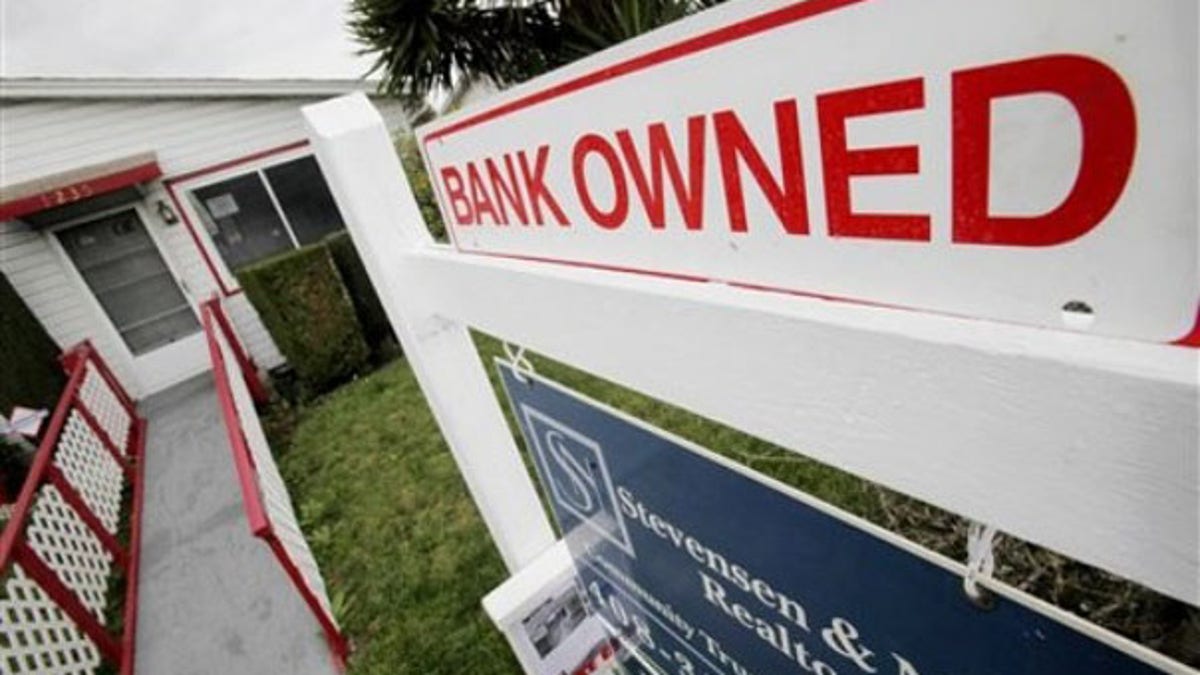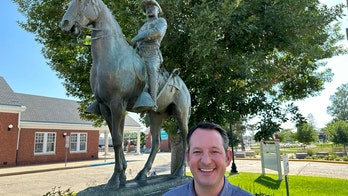
A foreclosed home is shown in East Palo Alto, Calif., Feb. 19. (AP Photo)
You qualify.
Those two words, from the mouth of a bank representative last October, triggered a wave of relief for Tracy Davis and her husband James. The couple had been in and out of work for three years and were struggling to pay their mortgage -- so when the Bank of America worker told them they qualified under a federal program to have their loan modified, they finally saw a path to keeping their house.
"We walked out thinking, great," Tracy Davis said.
But weeks went by, and nobody contacted them, and they weren't able to reach anyone -- other than representatives at a call center in India.
"To this day, we've not heard from someone," she said. "It's February. This goes back to October 30."
The Davises, who live in Cincinnati, are among a slew of struggling homeowners coming forward with complaints about the way banks are operating under a federal loan modification program announced last year by the Obama administration. The program, called the Home Affordable Modification Program, aims to keep 3 to 4 million people in their homes. Federal statistics show banks are making plenty of offers, but relatively few of those loan changes are being made permanent -- of the more than 1 million homeowners who have started the required three-month trial period, only 116,000 have had their new terms made permanent.
The complaints have a common tune. Homeowners say the banks are giving them the runaround -- either by pledging to modify loans and then not following through, as with the Davis family, or by signing them up for the trial period and then leaving them in limbo.
"This is an epidemic problem," said Stuart Rossman, director of litigation with the National Consumer Law Center.
Under the terms of the Treasury Department program, participating banks that offer new loan terms are supposed to put homeowners through a three-month trial period. If the homeowners make timely payments and meet other conditions, the terms are supposed to become permanent.
But a pair of lawsuits filed in U.S. District Court in Boston this past week claimed Bank of America and Wells Fargo were violating those rules.
Rossman, who is helping to represent the plaintiffs, said banks -- in Massachusetts and across the country -- are stringing homeowners along for months without sealing the deal.
"That, to us, is inexcusable and a breach of contract," he said. "They are living in limbo while they are at risk of losing their home."
In the Massachusetts cases, the lawsuits describe a Kafkaesque scenario in which the banks have been holding up the loan terms because of missing paperwork that they either won't identify or never required in the first place.
For instance, homeowners Odalid and Wilfredo Bosque, according to one suit, entered the trial period from October to December of last year, but after they "timely made each of the payments," Wells Fargo did not offer a final agreement. The Bosques were told that they did not submit their paperwork, but when they called the bank, agents purportedly told them "there is no paperwork missing." Meanwhile, they continued to receive calls from the collections agency.
Wells Fargo issued a statement saying the bank has "diligently" worked with homeowners to complete the loan modifications for customers who meet the guidelines.
"Unfortunately, not all customers who enter a HAMP trial ultimately qualify for the program. In these instances, we work to determine if another foreclosure prevention option is available to them," the written statement said.
Rossman said that his borrowers qualified.
In Ohio, the Davises were among 10 plaintiffs in a suit filed against Bank of America in early February in U.S. District Court. The homeowners all say they experienced the same problem. According to the suit, they went to a Treasury-sponsored "borrower outreach" event in Cincinnati at the end of October at which bank representatives offered them modified home loans and pledged to send them the paperwork "within weeks."
The documents never came, they say.
Tracy Davis said the representative she and her husband met with gave them her phone number and extension and said they would receive a packet within seven business days. When it never came, she tried the number, but she was not able to reach the extension. She said she was sent instead to a call center in India that could not help, and that numerous e-mails to the representative went unanswered.
"It's just not right," Davis said.
She said she and her husband had good-paying jobs until late 2006, when she was laid off from the title insurance company she worked for in the midst of the housing market collapse. After that, her husband lost his job. Then she got hired doing administrative work, but she was laid off nine weeks later. Finally, she got a job at a grocery store, where her husband also recently started working -- but their income, she said, is about one-third of what it used to be. With mortgage payments at above $1,000, she was hoping to reduce it to below $400 by stretching her mortgage from 15 to 30 years.
"It's been a rough three years," she said.
She received a package from Bank of America after she filed the suit, but she has turned that over to her attorney.
Bank of America could not be reached for comment.
The Treasury program, part of a $75 billion effort, has been billed as a way to keep millions in their homes by preventing foreclosure.
Under the program, banks get $1,000 for every modification, and then they can receive $1,000 a year for up to three years. Borrowers, too, can get $1,000 a year from the government under the plan, though the incentives don't kick in until after the three-month trial. The program is meant to reduce monthly mortgage payments to 31 percent of income.
Government statistics from January show Bank of America has offered the modifications to nearly 330,000 homeowners, but it made only 12,761 permanent. Wells Fargo has made 188,749 offers and made 17,652 permanent. There's a gap between those figures for most banks. J.P. Morgan Chase, for instance, made more than 222,000 offers, but sealed 11,581 of them.
Homeowners aren't just having a hard time winning modifications under the Home Affordable Modification Program. Personal accounts detail trouble getting loan modifications of any kind.
At least one plaintiff in the Ohio case was told she did not qualify under HAMP but could get an extension anyway. But the same thing that happened to Davis happened to her. She says nobody called her, and when she called the bank she was told Bank of America had none of the information she gave the representative at the October meeting.
She was told she qualified under a separate program and forced to re-start the process several times, according to the suit, until she was told in January that she did not qualify. Then she was told again that she qualified for a review, and she re-submitted her paperwork once more.
Bruce W. Gavin, who lives in Glen Burnie, Md., said he's been trying for years to get his home loan modified to no avail.
He said his monthly payment had been climbing continuously since he and his wife refinanced a decade ago -- it went from about $800 to $1,600, which was too much. Gavin said his son has autism, his wife has lupus and he's the only one who works. He lost his job five years ago, and his new job doesn't pay enough to be able to afford the higher mortgage -- which was pegged to an interest rate of 10.25 percent.
Gavin said he was rejected for one program, but was finally able to go under consideration for a loan modification program through Bank of America. His request? Lower the interest rate and turn the 20 years left on the loan into a 30-year plan.
During that period, he said he was told not to make mortgage payments.
Then came a bank letter last month, telling him he had until Jan. 26 to accept an agreement that was even worse or be foreclosed. The interest rate would stay at 10.25 percent and he'd be required to make up for the lost payments, pushing his monthly payment to more than $2,000.
He signed it, in part out of concern that moving would aggravate his son's autism.
"It's been a mess," Gavin said. "I don't even know what to do."
Mark Lawson, an attorney with the Legal Aid Society of Southwest Ohio representing the plaintiffs in the Ohio federal case, said loan modification problems are widespread.
"It's pretty much everywhere," he said.




